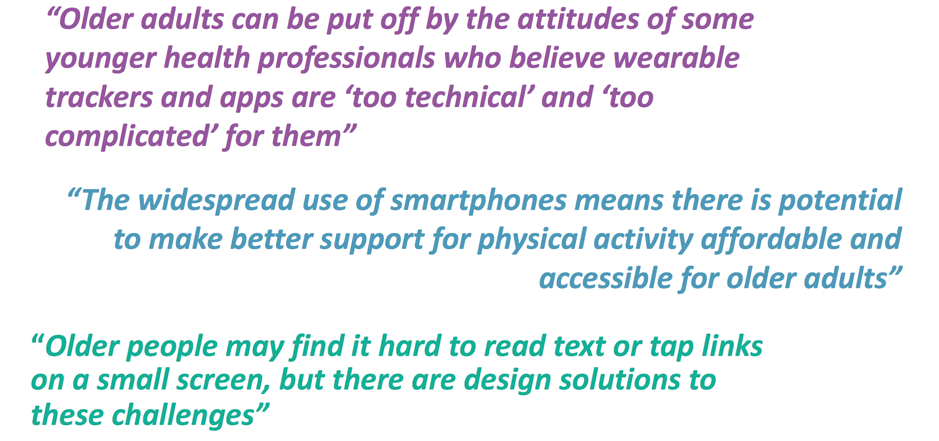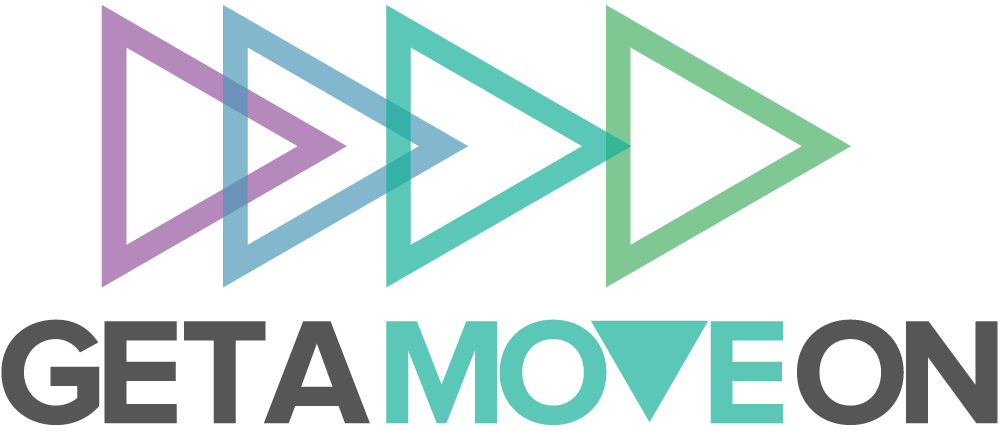Deep Dive #3
Are technology-enabled physical activity programmes suitable for older people? Surely most older people don’t really use technology? You might be surprised...

Find out more about the Deep Dive series
Surface skim
Ofcom data shows that older adults use a wide range of digital technologies and usage rates are much higher than is commonly believed. For example, mobile phone use is above 96% for people aged 55 to 64, 92% for people aged 65 to 74 and 81% for people aged over 75. Older people are generally very positive about the idea of technology-enabled support for physical activity. However, the preconceptions of younger healthcare and physical activity professionals that technology is ‘too complicated’ for them can put them off. There are some real issues about ease of use for older people, for example, small and fiddly on-screen menus, but this can be mitigated by using alternatives such as conversational technologies and involving users in the design of technology-enabled physical activity programmes and initiatives to ensure they meet their needs.
Deep dive
What do the stats say about older people’s use of technology?
There is a common belief that older people don’t have access to digital technologies and/or don’t want to use them. But this is not borne out by current data (2019) from Ofcom28. Older people use a wide range of digital devices. 60% of over 50s use between four and seven digital devices on a regular basis. 81% of 55 to 64 year olds use the internet, 67% of 65 to 74 year olds do, and 52% of those 75+ are also online. 79% of adults in the UK use a smartphone and the numbers increasing year on year. Even for older adults, mobile phone use is above 96% for people aged 55 to 64, 92% for people aged 65 to 74 and 81% for people aged over 75.
Professionals' attitudes can be a barrier to older people’s use of technology
There are some specific barriers to older people’s adoption of digital technologies but age, in and of itself, is not one of them29. Nevertheless, research shows that some younger health professionals may believe that wearable trackers and apps are ‘too technical’ and ‘too complicated’ for older adults, despite evidence that older adults can enjoy using them.30, 31 This matters because the promotion of wearable devices by health professionals would make older adults more likely to use them but these preconceptions can actively discourage them32.
Older people are positive about technology-enabled physical activity programmes
Technology-enabled, remote physical activity programmes, can make support more accessible for older people in a cost-effective way. A recent study of people up to age 83 with an average age of 64.75 who had chronic conditions found high levels both of technology use and desire for a technology-enabled remote exercise rehabilitation programme. 73% were interested in receiving ongoing exercise rehabilitation support via their smartphones. 72.4% were interested in receiving ongoing exercise rehabilitation via the internet33. Similarly, a study of cardiac patients aged up to 76.2 years with an average age of 61.7 found 75% expressed at least medium interest in a technology-enabled, home-based, ‘virtual’ cardiac rehabilitation programme34.
Overcoming the real challenges of technology
Some technologies do present real challenges for older people, for example, they may find it harder to read text or tap links on small screens, but such challenges can be mitigated, for example, though the use of voice-based rather than screen-based technologies, and by involving users in technology design. The work of Prof Nirmalie Wiratunga has demonstrated the effectiveness of this approach for older adults35.
Case studies
Could a tracker you can talk to help older adults be more active?
Prof Nirmalie Wiratunga and Anjana Wijekoon from RGU have been investigating whether an activity tracker you can talk to could make health technologies more accessible to those older adults who find on-screen menus difficult to use. She is leading a project to develop a conversational system that can monitor the physical activity levels of older adults from sensor data and provide a personalised, conversational programme to increase their physical activity. Watch the FitChat project video
A new rehab app for home-based physio support after knee surgery
Knee replacement surgery can be life-transforming. The greatest benefits are likely to come when patients continue all their rehab exercises after leaving the hospital, but it can be a real challenge for many to get to physio sessions after they've been discharged. Dr Lyndsay Alexander from RGU is developing a new app that can be used to deliver rehab programmes remotely so that patients can do their exercises at home, while still getting the best information and guidance from the physiotherapy team. Watch her video about the project
Designing for agency and compassion: technology to support physical activity in later life
Dr Kathrin Gerling’s work, presented at the GetAMoveOn Symposium26 highlighted the need to develop physical activity technologies specifically aimed at older people which take account of the real physical impacts of ageing. Goals and feedback need to be tailored to the abilities of older people, otherwise, their experience of using activity technologies will just be one of ‘failure’.
You may also be interested in:
Deep Dive #1: What really motivates people to be more active?
Deep Dive #4: Should we just give everyone an activity tracker? Would that do the trick?
Deep Dive #5: Aren’t we all addicted to our phones? Shouldn’t we be using technology less, not more?







